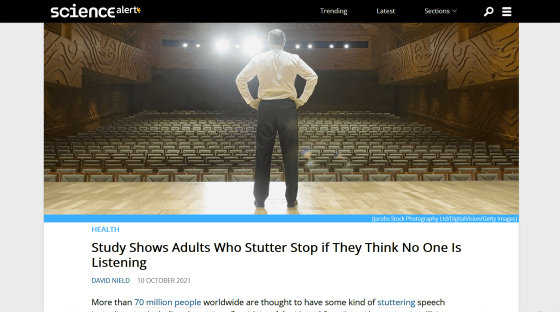Research shows that adults with stuttering will not stutter if they believe that 'no one is listening to their voice.'

Adults who stutter do not stutter during private speech --ScienceDirect
https://www.sciencedirect.com/science/article/abs/pii/S0094730X21000577
Study finds that adults who stutter don't stutter when they're alone
https://www.nyu.edu/about/news-publications/news/2021/october/study-finds-that-adults-who-stutter-don-t-stutter-when-they-re-a.html
Study Shows Adults Who Stutter Stop if They Think No One Is Listening
https://www.sciencealert.com/study-shows-adults-who-stutter-stop-if-they-think-no-one-is-listening

Previously, there were reports of cases where 'even people with stuttering do not stutter when speaking alone', but there was no evidence to support this phenomenon. Assistant Professor Eric Jackson, who studies stuttering at New York University, said, 'There is a lot of anecdotal evidence that a person with stuttering does not stutter when talking alone, but people say,'I'm really alone.' This phenomenon has not been confirmed in the laboratory because it is difficult to create believable conditions. '
Therefore, a research team led by Mr. Jackson conducted an experiment in which 24 subjects with stuttering were asked to speak in various scenarios. The scenario prepared by the research team is two listeners who use the same words spoken in 'Reading aloud', 'Conversation with researcher 1', 'Conversation with researcher 2', 'Private speech', and 'Private speech'. Talk to. '
In the 'private speech' of the five scenarios, subjects were asked to perform 'difficult tasks in computer programming.' Previous studies have shown that difficult tasks in computer programming elicit soliloquy from subjects. The research team also explained to the subjects, 'The words spoken during a private speech are not heard or analyzed by the research team.' 'The bigger the soliloquy, the better the performance in computer programming tasks.' There is a high possibility that it will fit in. ' In order to re-speak the words spoken in a private speech in a later scenario, the words were not transcribed by the researcher, but were transcribed using 'real-time automatic transcription software'.
However, the explanation 'Don't listen to the words spoken in a private speech' was a lie to deceive the subject, and in fact, the words spoken in a private speech were also recorded by the research team. In other words, even though the research team is actually listening, by preparing a real-time automatic transcription software etc., the subject himself can believe that 'this voice is not heard by anyone'. I made it.
As a result of the research team's analysis of the utterances in the five scenarios, it was found that only 'private speech', which the subject thought was 'no one heard,' caused almost no stuttering.
This is a percentage of the frequency of stuttering in the five scenarios. In 'conversation 1', 'reading', 'private speech +', and 'conversation 2', you can see stuttering in many syllables. Almost no stuttering was observed in 'private speech'. According to the research team, no stuttering was observed in more than 10,000 syllables, except that 3 out of 24 subjects showed mild stuttering in a total of 7 syllables in private speeches.

'I have developed a new method to convince subjects that'I am alone and no one can hear my speech,'and those with adult stuttering have these conditions,' said Jackson. I found that there was no stuttering. '
In addition, the research method to deceive the subjects this time was approved by the judging committee of New York University, and all the subjects recorded and analyzed the utterance of 'Private speech' after the research. I was informed that. Subjects accepted this fact and agreed to participate in further studies.
Jackson points out that the presence of the listener and the situation in which someone may be speaking gives the speaker the potential for social recognition, while personal soliloquy does not include a social component. 'I think the results of this study provide evidence that stuttering is not just a matter of'speech', but a strong social element at its core.'

Related Posts:
in Science, Posted by log1h_ik







